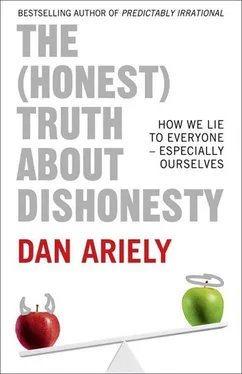Ariely, Dan - The (Honest) Truth About Dishonesty - How We Lie to Everyone – Especially Ourselves
Здесь есть возможность читать онлайн «Ariely, Dan - The (Honest) Truth About Dishonesty - How We Lie to Everyone – Especially Ourselves» весь текст электронной книги совершенно бесплатно (целиком полную версию без сокращений). В некоторых случаях можно слушать аудио, скачать через торрент в формате fb2 и присутствует краткое содержание. Жанр: Старинная литература, на английском языке. Описание произведения, (предисловие) а так же отзывы посетителей доступны на портале библиотеки ЛибКат.
- Название:The (Honest) Truth About Dishonesty: How We Lie to Everyone – Especially Ourselves
- Автор:
- Жанр:
- Год:неизвестен
- ISBN:нет данных
- Рейтинг книги:4 / 5. Голосов: 1
-
Избранное:Добавить в избранное
- Отзывы:
-
Ваша оценка:
- 80
- 1
- 2
- 3
- 4
- 5
The (Honest) Truth About Dishonesty: How We Lie to Everyone – Especially Ourselves: краткое содержание, описание и аннотация
Предлагаем к чтению аннотацию, описание, краткое содержание или предисловие (зависит от того, что написал сам автор книги «The (Honest) Truth About Dishonesty: How We Lie to Everyone – Especially Ourselves»). Если вы не нашли необходимую информацию о книге — напишите в комментариях, мы постараемся отыскать её.
The (Honest) Truth About Dishonesty: How We Lie to Everyone – Especially Ourselves — читать онлайн бесплатно полную книгу (весь текст) целиком
Ниже представлен текст книги, разбитый по страницам. Система сохранения места последней прочитанной страницы, позволяет с удобством читать онлайн бесплатно книгу «The (Honest) Truth About Dishonesty: How We Lie to Everyone – Especially Ourselves», без необходимости каждый раз заново искать на чём Вы остановились. Поставьте закладку, и сможете в любой момент перейти на страницу, на которой закончили чтение.
Интервал:
Закладка:
After reflecting on these observations, I came away thinking that the locksmith was probably right. It’s not that 98 percent of people are immoral or will cheat anytime the opportunity arises; it’s more likely that most of us need little reminders to keep ourselves on the right path.
How to Get People to Cheat Less
Now that we had figured out how the fudge factor works and how to expand it, as our next step we wanted to figure out whether we could decrease the fudge factor and get people to cheat less. This idea, too, was spawned by a little joke:
A visibly upset man goes to see his rabbi one day and says, “Rabbi, you won’t believe what happened to me! Last week, someone stole my bicycle from synagogue!”
The rabbi is deeply upset by this, but after thinking for a moment, he offers a solution: “Next week come to services, sit in the front row, and when we recite the Ten Commandments, turn around and look at the people behind you. And when we get to ‘Thou shalt not steal,’ see who can’t look you in the eyes and that’s your guy.” The rabbi is very pleased with his suggestion, and so is the man.
At the next service, the rabbi is very curious to learn whether his advice panned out. He waits for the man by the doors of the synagogue, and asks him, “So, did it work?”
“Like a charm,” the man answers. “The moment we got to ‘Thou shalt not commit adultery,’ I remembered where I left my bike.”
What this little joke suggests is that our memory and awareness of moral codes (such as the Ten Commandments) might have an effect on how we view our own behavior.
Inspired by the lesson behind this joke, Nina, On, and I ran an experiment at the University of California, Los Angeles (UCLA). We took a group of 450 participants and split them into two groups. We asked half of them to try to recall the Ten Commandments and then tempted them to cheat on our matrix task. We asked the other half to try to recall ten books they had read in high school before setting them loose on the matrices and the opportunity to cheat. Among the group who recalled the ten books, we saw the typical widespread but moderate cheating. On the other hand, in the group that was asked to recall the Ten Commandments, we observed no cheating whatsoever. And that was despite the fact that no one in the group was able to recall all ten.
This result was very intriguing. It seemed that merely trying to recall moral standards was enough to improve moral behavior. In another attempt to test this effect, we asked a group of self-declared atheists to swear on a Bible and then gave them the opportunity to claim extra earnings on the matrix task. What did the atheists do? They did not stray from the straight-and-narrow path.
These experiments with moral reminders suggest that our willingness and tendency to cheat could be diminished if we are given reminders of ethical standards. But although using the Ten Commandments and the Bible as honesty-building mechanisms might be helpful, introducing religious tenets into society on a broader basis as a means to reduce cheating is not very practical (not to mention the fact that doing so would violate the separation of church and state). So we began to think of more general, practical, and secular ways to shrink the fudge factor, which led us to test the honor codes that many universities already use.
To discover whether honor codes work, we asked a group of MIT and Yale students to sign such a code just before giving half of them a chance to cheat on the matrix tasks. The statement read, “I understand that this experiment falls under the guidelines of the MIT/Yale honor code.” The students who were not asked to sign cheated a little bit, but the MIT and Yale students who signed this statement did not cheat at all. And that was despite the fact that neither university has an honor code (somewhat like the effect that swearing on the Bible had on the self-declared atheists).
STEALING PAPER
A few years ago I received a letter from a woman named Rhonda who attended the University of California at Berkeley. She told me about a problem she’d had in her house and how a little ethical reminder helped her solve it.
She was living near campus with several other people—none of whom knew one another. When the cleaning people came each weekend, they left several rolls of toilet paper in each of the two bathrooms. However, by Monday all the toilet paper would be gone. It was a classic tragedy-of-the-commons situation: because some people hoarded the toilet paper and took more than their fair share, the public resource was destroyed for everyone else.
After reading about the Ten Commandments experiment on my blog, Rhonda put a note in one of the bathrooms asking people not to remove toilet paper, as it was a shared commodity. To her great satisfaction, one roll reappeared in a few hours, and another the next day. In the other note-free bathroom, however, there was no toilet paper until the following weekend, when the cleaning people returned.
This little experiment demonstrates how effective small reminders can be in helping us maintain our ethical standards and, in this case, a fully stocked bathroom.
We found that an honor code worked in universities that don’t have an honor code, but what about universities that have a strong honor code? Would their students cheat less all the time? Or would they cheat less only when they signed the honor code? Luckily, at the time I was spending some time at the Institute for Advanced Study at Princeton University, which was a great petri dish in which to test this idea.
Princeton University has a rigorous honor system that’s been around since 1893. Incoming freshmen receive a copy of the Honor Code Constitution and a letter from the Honor Committee about the honor system, which they must sign before they can matriculate. They also attend mandatory talks about the importance of the Honor Code during their first week of school. Following the lectures, the incoming Princetonians further discuss the system with their dorm advising group. As if that weren’t enough, one of the campus music groups, the Triangle Club, performs its “Honor Code Song” for the incoming class.
For the rest of their time at Princeton, students are repeatedly reminded of the honor code: they sign an honor code at the end of every paper they submit (“This paper represents my own work in accordance with University regulations”). They sign another pledge for every exam, test, or quiz (“I pledge my honor that I have not violated the honor code during this examination”), and they receive biannual reminder e-mails from the Honor Committee.
To see if Princeton’s crash course on morality has a long-term effect, I waited two weeks after the freshmen finished their ethics training before tempting them to cheat—giving them the same opportunities as the students at MIT and Yale (which have neither an honor code nor a weeklong course on academic honesty). Were the Princeton students, still relatively fresh from their immersion in the honor code, more honest when they completed the matrix task?
Sadly, they were not. When the Princeton students were asked to sign the honor code, they did not cheat at all (but neither did the MIT or Yale students). However, when they were not asked to sign the honor code, they cheated just as much as their counterparts at MIT and Yale. It seems that the crash course, the propaganda on morality, and the existence of an honor code did not have a lasting influence on the moral fiber of the Princetonians.
These results are both depressing and promising. On the depressing side, it seems that it is very difficult to alter our behavior so that we become more ethical and that a crash course on morality will not suffice. (I suspect that this ineffectiveness also applies to much of the ethics training that takes place in businesses, universities, and business schools.) More generally, the results suggest that it’s quite a challenge to create a long-term cultural change when it comes to ethics.
Читать дальшеИнтервал:
Закладка:
Похожие книги на «The (Honest) Truth About Dishonesty: How We Lie to Everyone – Especially Ourselves»
Представляем Вашему вниманию похожие книги на «The (Honest) Truth About Dishonesty: How We Lie to Everyone – Especially Ourselves» списком для выбора. Мы отобрали схожую по названию и смыслу литературу в надежде предоставить читателям больше вариантов отыскать новые, интересные, ещё непрочитанные произведения.
Обсуждение, отзывы о книге «The (Honest) Truth About Dishonesty: How We Lie to Everyone – Especially Ourselves» и просто собственные мнения читателей. Оставьте ваши комментарии, напишите, что Вы думаете о произведении, его смысле или главных героях. Укажите что конкретно понравилось, а что нет, и почему Вы так считаете.












